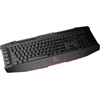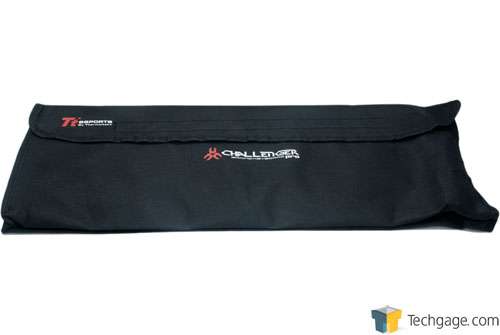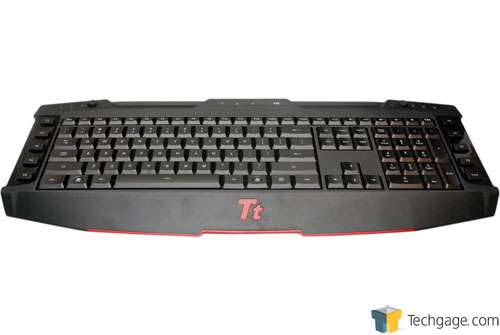- Qualcomm Launches Snapdragon 4 Gen 2 Mobile Platform
- AMD Launches Ryzen PRO 7000 Series Mobile & Desktop Platform
- Intel Launches Sleek Single-Slot Arc Pro A60 Workstation Graphics Card
- NVIDIA Announces Latest Ada Lovelace Additions: GeForce RTX 4060 Ti & RTX 4060
- Maxon Redshift With AMD Radeon GPU Rendering Support Now Available
Tt eSPORTS Challenger Pro Gaming Keyboard

The “professional gaming” market is filled with some first-rate competition, but Thermaltake believes it can deliver some of the best offerings out there. To help prove it, it’s even created a unique brand, called “Tt eSPORTS”. Let’s take a look at one of the first products to fall under that brand, the Challenger Pro gaming keyboard.
Page 1 – Introduction
Compared to some of its competitors, Thermaltake is a rather young company. It was founded in Taipei County in 1999, and since then, it has become the go-to component company for many PC builders, enthusiasts and gamers. I’ve had friends of mine who weren’t too well-versed in PCs request Thermaltake parts, so there’s something that the company has done very right.
After the company’s founding, it produced computer chassis, power supplies and cooling products, but it has recently been on the path of major expansion. A couple of years ago, the company launched its LUXA2 brand, which features higher-end components and mobile accessories. In continuing this expansion, the company announced earlier this year its foray into professional gaming accessories, and the fruits of that are finally beginning to come to market.
It’s important to note that these gaming products aren’t part of a series put out by Thermaltake, but rather are categorized under a different branding, “Tt eSPORTS”. At its heart, Tt eSPORTS is still part of Thermaltake, but the company clearly expects enough success to warrant unique branding. This is a trend we’ve seen other companies do as well, such as Cooler Master with its Choiix brand.
We first learned of Tt eSPORTS almost eleven months ago at the CES event, and then saw a slew of related product at Computex this past June. The time to launch here is rather interesting, because the keyboard I’m reviewing today, I used at CES in what seemed like its near-finished form. Thermaltake has proven itself to be a company that doesn’t rush things, that’s for certain.
Closer Look
In talking to Thermaltake at Computex this past summer, I was told that it had enlisted the help of professional gamers in designing its Tt eSPORTS products, although it didn’t name names. The company has been active in the LAN party and professional gaming circuits, however, so it can be assumed that it has gathered information via a number of different means.
Kicking things off, there are two different keyboard models that are currently available on the market, the Challenger and Challenger Pro. The non-Pro version lacks the robust macro solution, backlighting, replacement keys (8 in total) and the two USB 2.0 ports. The pricing difference between the two models is ~$20, and given what the Pro packs in, the premium seems reasonable.
After taking the keyboard out of its box, you’ll find it safely stowed away in a bag made of a soft durable material. This is a useful addition not only for shipping purposes, but also for LAN gamers who want a reliable way of safely bringing their keyboard to and from a LAN party.
For those who care a lot about the keys on gaming keyboards, you’ll likely know right away whether or not the Challenger is for you. I wouldn’t go as far to say that these keys are like those found on notebooks, but they are not close to being mechanical offerings either. They’re silent and don’t offer a lot of feedback, but they’re very responsive.
The Challenger is going to appeal greatly to those who want a clean-looking board, as there’s nothing too flashy here. The only non-black aspect is the red trim at the bottom and also the logo. Like the keys, the Tt logo lights up red when the keyboard is in use (both can be disabled).
Support our efforts! With ad revenue at an all-time low for written websites, we're relying more than ever on reader support to help us continue putting so much effort into this type of content. You can support us by becoming a Patron, or by using our Amazon shopping affiliate links listed through our articles. Thanks for your support!







